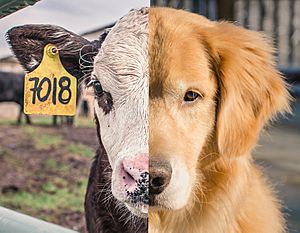Speciesism facts for kids
Speciesism is a way of thinking where people treat one animal species as more important than another. This happens even when their needs are similar. It means you might not care about an animal's feelings just because of what type of animal it is.
Many people who support veganism or animal rights say that speciesism is like other unfair ideas, such as racism or sexism. These ideas judge someone based on their group, not on who they are as an individual. Speciesism can lead to animals being treated badly. This includes things like factory farming, using animals for entertainment (like in bullfighting or rodeos), taking their fur or skin, and doing experiments on them. It also means sometimes not helping wild animals who are hurting in nature.
For example, imagine a dog and a cow both need their tails removed by a vet. If someone believes the dog should get pain medicine but the cow doesn't need it, just because "it's just a cow," that's speciesism. It ignores the cow's need to not feel intense pain because of its species.
It is possible to care more about one species than another without being speciesist. For example, humans can vote, but a gorilla cannot. This is because voting needs an understanding of politics. If a gorilla could understand and join a political system, then they would have an interest in voting too.
What Are Common Speciesist Ideas?
There are a few common ways speciesism shows up:
- Thinking humans are better than other animals: This is often called human supremacism. It means giving humans special rights and protections that other animals don't get.
- Favoring some nonhuman animals over others: Sometimes, people prefer certain animals because they seem similar to humans. For example, some might favor dogs over cattle. This could be because dogs live closer to humans or are seen as more useful.
- Believing some species are simply superior: This is when people think animals like pigs don't matter much, but horses matter a lot. This can happen even if both animals have similar thinking abilities.
- Harming or ignoring wild animals to "save" a species: This idea means hurting or not helping individual wild animals. It is done in the name of protecting a whole species, population, or ecosystem.
Images for kids
-
Richard D. Ryder created the word "speciesism" in 1970.
-
Peter Singer made the idea popular in his book Animal Liberation (1975).
-
A protest against speciesism in Montreal in 2015.
-
Anti-speciesism graffiti in Turin.
-
The Trial of Bill Burns (1838) in London. It shows Richard Martin (a politician) in court with a donkey that was beaten. This led to the first known animal cruelty conviction in Europe.
-
Richard Dawkins says speciesism is an example of how our minds sometimes see things as completely separate.
See also
 In Spanish: Especismo para niños
In Spanish: Especismo para niños
 | Selma Burke |
 | Pauline Powell Burns |
 | Frederick J. Brown |
 | Robert Blackburn |










